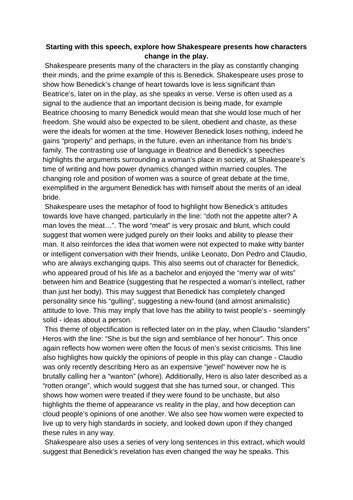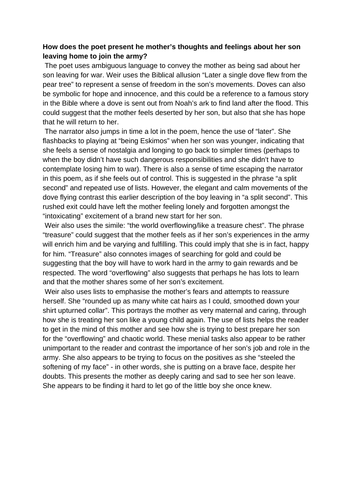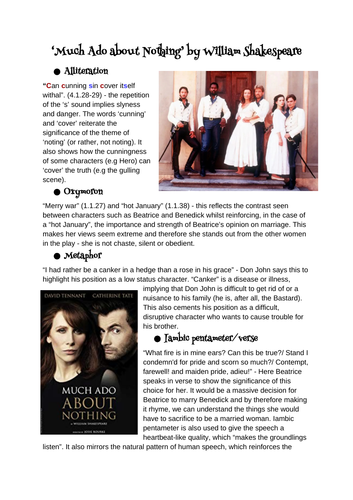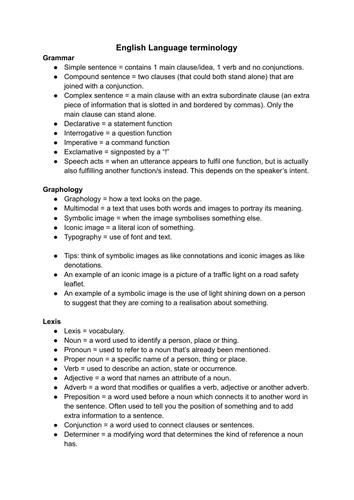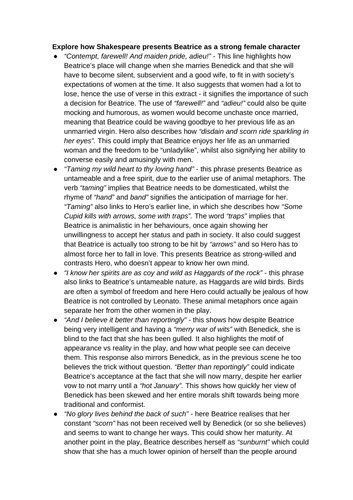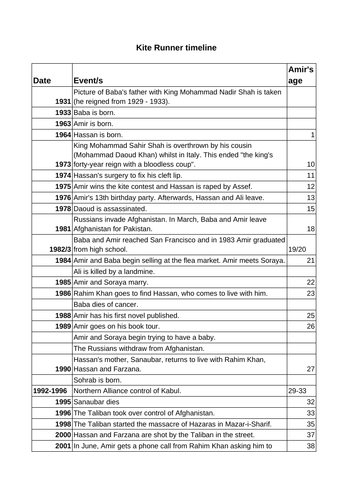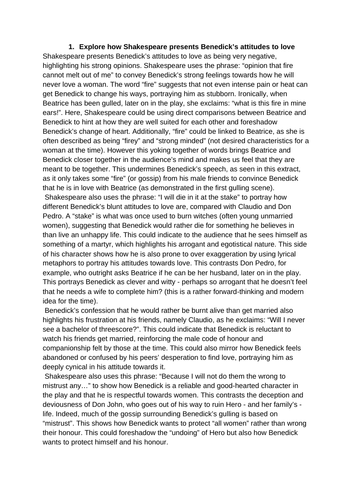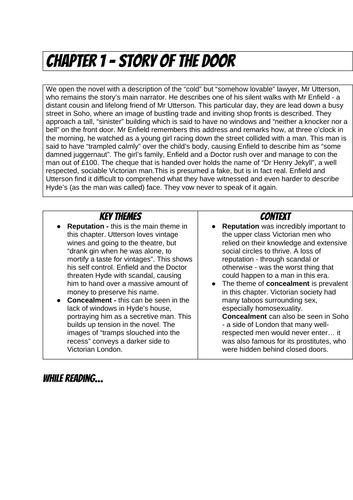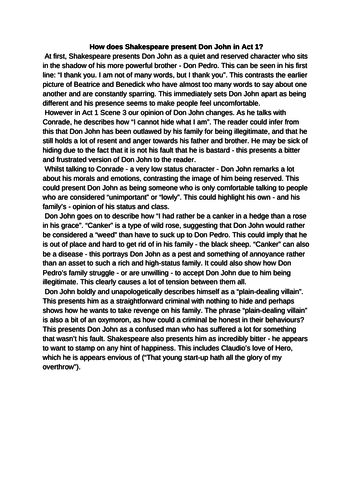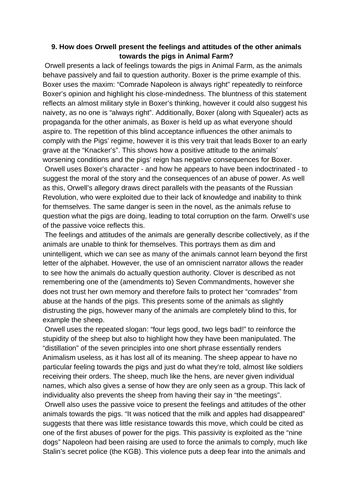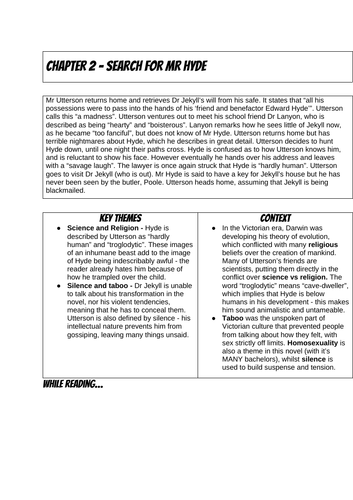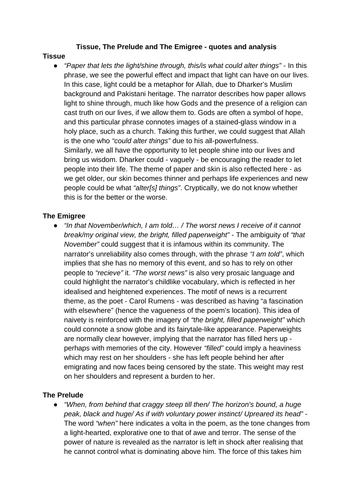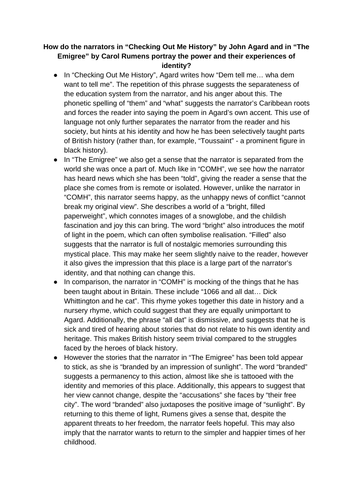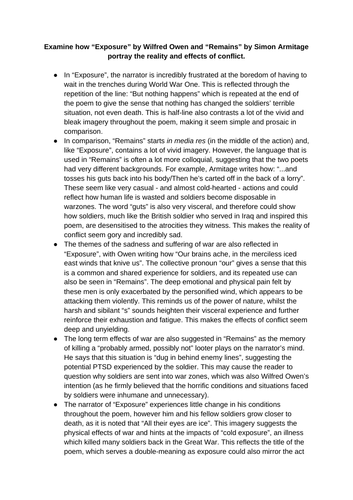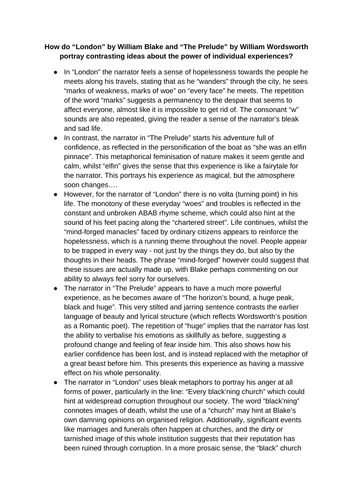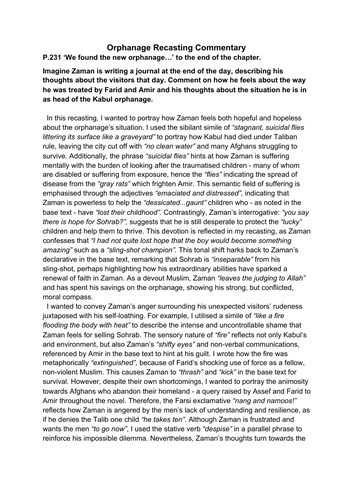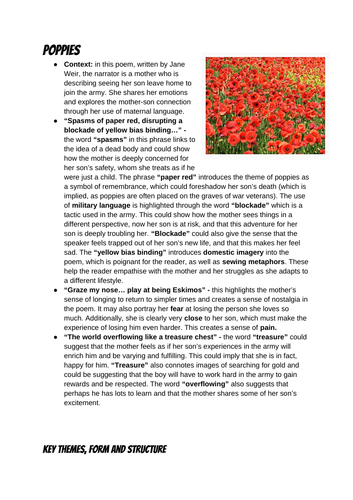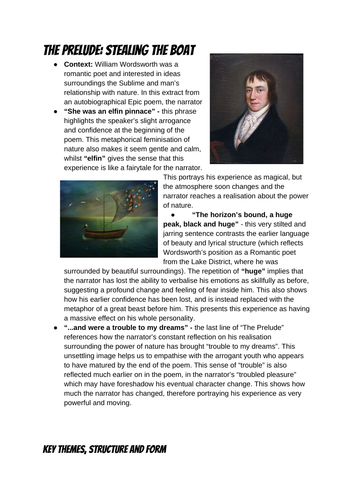
214Uploads
95k+Views
7k+Downloads
English language arts

GCSE English AQA Much Ado about Nothing model essay answer (band 6)
A model essay (that would be well into the highest band) that answers the question: “Starting with this speech, explore how Shakespeare presents how characters change in the play”. Can be used for students to compare their answers to or in class as an analysis task (e.g picking out the technique, word analysis, context, etc.). Specifically designed for the AQA GCSE English specification but can be used on any exam board that uses this Shakespearean text.

GCSE English AQA Power and Conflict poetry "Poppies" by Jane Weir model answer
A model answer (top grades) to the question: “How does the poet present the mother’s thoughts and feelings about her son leaving home to join the army?”. This answer is an unseen poetry practice, however you could use this essay to analyse and “mark” with students in class or for homework. Designed specifically for the AQA GCSE English Lit Power and Conflict poetry cluster for “Poppies” by Jane Weir, but could be used for any exam board that uses this poem. Explores symbolism, structure, allusion and word analysis.

Much Ado about nothing revision guide
A summary of some key themes and techniques used by Shakespeare in “Much Ado about Nothing”. Suitable for GCSE English literature and designed specifically as a revision tool for the AQA course. Helps students learn quotes and understand Shakspearean language. Provides detailed analysis, links to context and the rest of the play. Can be used for homework or in class.

AS/A Level English Language and Literature terminology list
This 6 page document includes all the key terminology and definitions that A Level English Lang and Lit students studying the AQA course need to know. The lsit is disaggregated by language level (phonology, lexis, semantics, grammar, graphology, discourse, pragmatics) and it also includes key ideas like goodwin’s story structure and labov’s narrative framework, as well as Grice’s cooperative principles.

Explore how Shakespeare presents Beatrice as a strong female character GCSE English Lit model essay
A few analysed quotes and paragraphs from Much Ado about Nothing around the topic of Beatrice as a strong female character. This question came up in the 2019 AQA GCSE English Lit Paper 1, so is definitely worth practicing! Detailed word analysis and use of developed points.

The Kite Runner Timeline A Level English Lang and Lit
This handy timeline includes all the key events from Khaled Hosseini’s the Kite Runner, as studied at AS/A Level AQA English Language and Literature.

Explore how Shakespeare presents Benedick’s attitudes to love
This is a model answer (at least high band 5) that answers the questions: “Explore how Shakespeare presents Benedick’s attitudes to love”. This also accompanies an extract from the play. Perfect for AQA GCSE English Lit 9-1 course.

GCSE English Lit Jekyll and Hyde revision sheet chapter 1
A simple revision sheet for AQA GCSE English lit Jekyll and Hyde - Chapter 1. Has space at the bottom for students to make their own notes/comments/language analysis whilst reading. Great revision tool for outside the classroom or homework.

How does Shakespeare present Don John in Act 1?
A summary of how Shakespeare presents Don John in Act 1 in the play “Much Ado about Nothing”. Suitable for GCSE English literature and designed specifically as a revision tool for the AQA course. Helps students learn quotes and understand Shakspearean language. Provides detailed analysis, links to context and the rest of the play. Can be used for homework or in class.

How does Orwell present the feelings of the other animals towards the pigs in Animal Farm?
A model exam question answer (in band 5, at least) for the question: “How does Orwell present the feelings and attitudes of the other animals towards the pigs in Animal Farm?”. Perfect for the AQA GCSE English Literature 9-1 course .

GCSE English Lit Jekyll and Hyde revision sheet chapter 2
A simple revision sheet for AQA GCSE English lit Jekyll and Hyde - Chapter 2. Has space at the bottom for students to make their own notes/comments/language analysis whilst reading. Great revision tool for outside the classroom or homework.

GCSE English power and conflict quotes analysis (Tissue, The Prelude and The Emigree)
Analysis of some key quotes from Tissue, The Prelude and The Emigree specifically designed for the AQA English Lit GCSE spec (but can be used with any exam board). Model answers.

How does “Checking Out Me History” and “The Emigree” portray the power of identity?
A useful bullet point list of developed paragraphs that answer the question: How do the narrators in “Checking Out Me History” by John Agard and in “The Emigree” by Carol Rumens portray the power and their experiences of identity? This includes detailed and higher level language analysis, use of terminology like metaphor and analysis of structure and form. Also addresses the key themes of each poem and the context surrounding them. Designed specifically for the AQA GCSE English Lit 9-1 Power and Conflict poetry cluster.

Examine how “Exposure”and “Remains” portray the reality and effects of conflict/war
A revision sheet answering the question: Examine how “Exposure” by Wilfred Owen and “Remains” by Simon Armitage portray the reality and effects of conflict. Contains detailed language analysis as well as contextual references, structure and form. The key themes of both poems are also explored in easy-to-read bullet points which link together. Specifically written for the AQA GCSE English Lit Paper 2 Power and Conflict poetry anthology.

How do “London” and “The Prelude” portray contrasting ideas about individual experiences?
A helpful revision sheet with some key quotes and in depth analysis of “London” by William Blake and “The Prelude: stealing the boat” by William Wordsworth, using techniques such as oxymoron, personification and metaphor. Explores the structure, context, form and language of each poem and their similarities and differences. Designed specifically for AQA GCSE English Lit (higher ability sets), studying the Power and Conflict poetry anthology.

A Level Kite Runner recasting and commentary model answer top band
This recasting (using a section from chapter 20, highlighted for AO2 and AO4) and commentary achieved close to full marks and answers the question: Read P.231 ‘We found the new orphanage…’ to the end of the chapter.
Imagine Zaman is writing a journal at the end of the day, describing his thoughts about the visitors that day. Comment on how he feels about the way he was treated by Farid and Amir and his thoughts about the situation he is in as head of the Kabul orphanage.
Suitable for the A Level AQA English Language and Literature course, for students studying the Kite Runner by Khaled Hosseini.

Poppies by Jane Weir GCSE English Lit revision guide
A handy revision guide containing detailed language analysis of several key quotes from this poem from the AQA GCSE English Lit Power and Conflict poetry cluster. Also includes: context, structure, form and key themes incorporated into linked bullet points. Can be used in class or set for students’ own at home revision. Includes an exam-style question at the end.

The Prelude: Stealing the Boat by William Wordsworth GCSE English Lit revision guide
A handy revision guide containing detailed language analysis of several key quotes from this poem from the AQA GCSE English Lit Power and Conflict poetry cluster. Also includes: context, structure, form and key themes incorporated into linked bullet points. Can be used in class or set for students’ own at home revision.

Checking out me History by John Agard GCSE English Lit revision guide
A handy revision guide containing detailed language analysis of several key quotes from this poem from the AQA GCSE English Lit Power and Conflict poetry cluster. Also includes: context, structure, form and key themes incorporated into linked bullet points. Can be used in class or set for students’ own at home revision.

How does Stoker use language to create horror and tension? AS Level model answer
Designed for the AS level Language and Literature AQA course, this model answer explores the structure, key themes and language analysis behind an annotated extract (attached) from Dracula by Bram Stoker.

